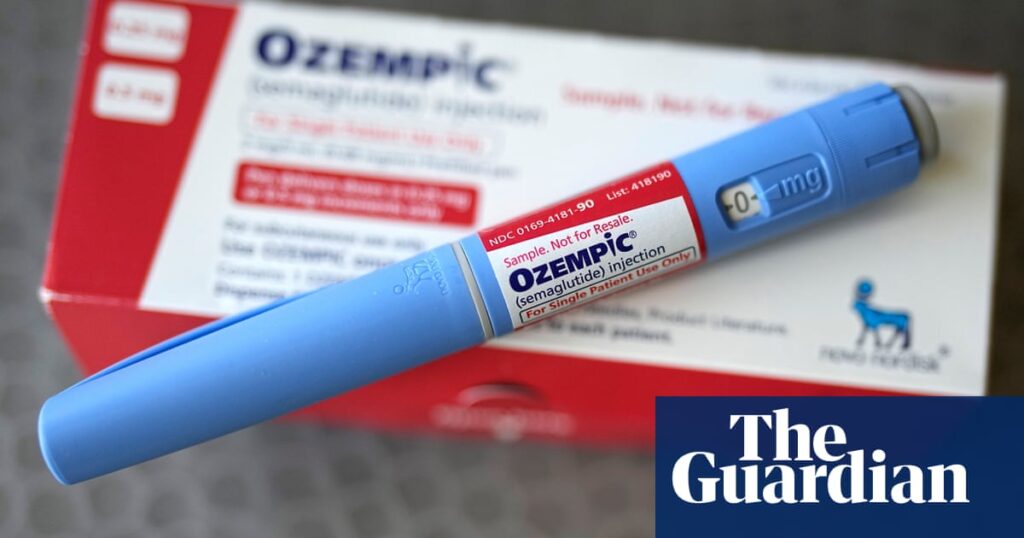There is a danger that the Government will use the skinny vaccine as an excuse to avoid making tough policy choices to prevent obesity, a leading expert has warned.
Prof Giles Yeo, a geneticist at the University of Cambridge and an expert on obesity and the brain's control of food intake, said drugs such as semaglutide, the active ingredient in the weight-loss injection Wegovi, were amazing and worked for the vast majority of people.
In fact, Wegovy, which is available on the NHS, can help people lose over 10% of their body weight. Drugs such as tirzepatide are even more effective. And drugs are becoming increasingly powerful in their ability to help people lose weight.
“The magnitude of the effect [in terms of weight loss] “The drugs that are coming out are amazing,” Yeo said, adding that products are being developed that would require a monthly injection instead of weekly.
But Yeo stressed that such drugs, known as GLP1 receptor agonists, were developed to treat, not prevent, obesity and related diseases.
To prevent obesity, Intention Government policy changes, a difficult road, and I think, and this is a real fear, actually, it's not just our government, but many governments and policymakers, [these drugs] “This is an excuse not to make difficult policy decisions. And that's a real problem,” he said.
Yeo added that prevention is better than cure.
“The longer you spend obese, the worse your health will be,” he says, “so if you can prevent obesity, you'll ultimately be healthier.”
Prevention is also a cheaper approach, avoiding costs associated with obesity-related symptoms and the costs associated with treating obesity, they noted.
“The problem is, this is a long-term cost,” Yeo said, noting that it means spanning many governments. As a result, long-term planning is needed, he said.
Yeo said one public health measure policymakers should take is to make healthy foods cheaper through subsidies so that they become the default choice even when funds are limited.
He also stressed the need to crack down on the placement of unhealthy foods in stores.
“I'm not a food Nazi, but I think if you want chocolate, or pudding, or anything, you should walk down to the aisle that says chocolate, walk down to the aisle that says lasagna, walk down to the aisle that says ice cream and buy that,” he said, noting that people will be able to make purchases of their own free will without being sold items they have no intention of buying.
Yeo said junk food advertising also needed to be regulated, but added that plans for a 9pm cut “now makes no sense” given that many people stream shows at their own leisure.
He also stressed that it was important that the measures against advertising were non-judgmental – that is, they would apply to all foods that meet set nutritional standards, such as being high in fat, salt or sugar, regardless of whether the foods in question come from fast food outlets or fine dining restaurants.
Yeo added that drugs such as semaglutide are effective in treating obesity and are being tested in other health areas, from dementia to addiction, but they have limitations.
After newsletter promotion
“It makes you feel full, and when you feel full, you eat less,” he says, “but it doesn't do anything to improve your eating habits.”
Yeo said it would be a concern if people with unhealthy diets were to use them.
“All this does is reduce the amount of unhealthy food you eat, so you lose weight, but you don't improve your eating habits,” he says. “You'll lose weight and be healthier, but it's not nearly as healthy as if you'd lost weight and eaten healthier.”
Yeo warned that there could also be unintended consequences, as an unhealthy diet can be deficient in protein and micronutrients, and small amounts may not reach recommended levels. If that's the case, people who eat less as a result of getting vaccinated could face other problems. “If they already have a poor diet, they could be at risk of becoming malnourished,” he said.
He noted that even people who eat a healthy diet while using the drug could experience unexpected results and, like any short-term weight loss diet, the Skinny Jab could lead to a loss of muscle mass.
“If you improve your diet with protein and other things and don't exercise, you're going to lose 50-50 fat and muscle mass. Nobody went in expecting to lose muscle mass,” he said.
Moreover, Yeo noted that while the drugs work equally well for obese and underweight people, they can alter blood sugar levels and have potential side effects, making it important that their use be monitored by medical professionals.
“On top of that, [people using the drugs] “You're probably going to need some very thorough dietary advice and some kind of exercise plan,” he said.
Ultimately, such drugs should be accepted as a means of treating obesity, but prevention remains key, Yeo said.
“The reality is, we must not lose sight of the fact that we still need to improve the environment,” he said.


